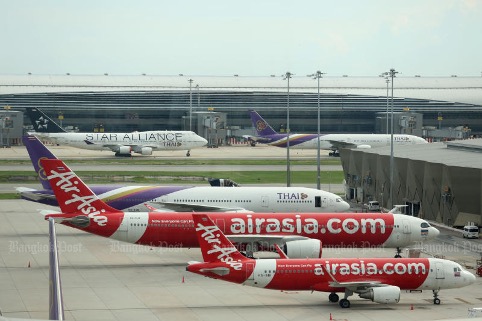Thai AirAsia (TAA) has suspended all flights this month and deferred paying its staff either wholly or partially until September.
The airline, regarded as one of the most robust domestic carriers, has faced a financial crunch from consistently low passenger volumes since the Covid-19 pandemic began early last year. All domestic airlines including this one also suffer from a lack of cash flow.
The airline stopped flying after the restrictions were launched last month. It says all flights will stay grounded for now after efforts to secure loans were in vain.
Another factor in the decision to keep flights grounded is that the latest lockdown order includes travel restrictions.
The wider aviation business in the country is also facing depleted liquidity and cash flow.
TAA announced a deferment of the whole or part of the salaries of its employees as part of an effort to ease cost pressures.
The July salaries for executives will be paid in September. Active employees at operational levels will be paid 50% of their July salaries this month and the rest in September. Inactive employees will receive 25% of their salaries in September as well.
The TAA said it will temporarily cease operations this month and hopes the situation will turn around next month. Once the airline has secured a loan, operations will resume.
Also, Thai Lion Air, another budget carrier, said it is looking to offer financial assistance to its staff after it suspended flights on July 21.
Meanwhile, the International Air Transport Association (IATA) called on governments to take action to address the high cost of Covid-19 tests in many jurisdictions.
It also urged flexibility in permitting the use of cost-effective antigen tests as an alternative to more expensive PCR tests.
According to IATA’s most recent traveller survey, 86% of respondents are willing to get tested. But 70% also believe that the cost of testing is a barrier to travel, while 78% believe governments should bear the cost of mandatory testing.
“The IATA supports Covid-19 testing as a pathway to reopen borders to international travel,” said IATA Director-General Willie Walsh.
In addition to being reliable, testing needs to be easily accessible, affordable, and appropriate to the risk level. Too many governments, however, are falling short on some or all of these, he said.
























